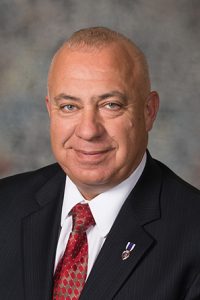Bills seek changes in state contracting
The Government, Military and Veterans Affairs Committee heard testimony Feb. 20 on two bills that would change state contracting rules.

Sen. Tom Brewer of Gordon introduced LB151, which would adopt the Government Neutrality in Contracting Act. Under the bill, a request for bids could not require or prohibit contractors or subcontractors from entering into or adhering to a collective bargaining agreement.
Brewer said the proposal would prohibit the state or any political subdivision from giving preference to union or non-union contractors when it accepts bids for contracts. He said he was unaware of any situation in which the state had done so.
“We just want to make sure the state isn’t playing favorites,” Brewer said.
David Chapin, chairperson of Associated Builders and Contractors, testified in favor of the bill. He said LB151 could prevent the state from entering into a project labor agreement—a collective bargaining agreement that details the terms of the contract before bidding begins. Such agreements drive up costs, he said.
“It’s a free-market issue,” Chapin said.
Electrical contractor Jay Buchanan also testified in favor of LB151. He said project labor agreements discriminate against the majority of workers who are non-union.
“It spits in the face of fair and open competition,” Buchanan said, adding that 24 states have outlawed project labor agreements.
Felicia Hilton of the North Central States Regional Council of Carpenters spoke against the bill. She said project labor agreements generally are used for large construction projects, like a football stadium, and are a valuable tool for states and municipalities.
“There’s nothing in state law that encourages or discourages use of these type of agreements, and it should stay that way,” Hilton said. “It makes no sense to ban the state from using this tool.”
Also testifying against the bill was Susan Martin of the Nebraska State AFL-CIO. Project labor agreements provide clear boundaries and expectations for a project, Martin said, leading to higher productivity and better pay for workers.
“The use of PLAs does not restrict competition by shutting out non-union contractors,” Martin said. “PLAs simply create a level playing field for all contractors by standardizing labor conditions on a project.”
The committee also considered LB21 introduced by Seward Sen. Mark Kolterman. The bill would allow a company to formally protest if it failed to secure a state contact that exceeds $5 million. The state Department of Administrative Services would create a protest procedure that would include a hearing within 60 days of a formal protest being filed.

Kolterman said the current appeal process is flawed, causing contractors to refuse to do business in the state.
“By not allowing judicial review, it puts Nebraska at a disadvantage,” Kolterman said.
Attorney Tom Kenny spoke in favor of LB21. It would fill in gaps in Nebraska’s bidding process, he said, and safeguard taxpayer money.
“We have large contractors come to us and say ‘what do you mean you don’t have a protest process?’ ” Kenny said. “That differs from other states, significantly.”
Also testifying in favor of LB21 was Kerry Winterer, former CEO of the state Department of Health and Human Services. Currently, he said, appeals are decided solely by the state Department of Administrative Services. As a result, in the past appeals often led to lawsuits, he said, causing the agency to delay a project while litigation worked its way through the courts.
“[Under LB21] litigation may well decline in the future as court precedents are set,” Winterer said.
Bo Botelho, interim CEO of DHHS, testified against the bill. He said the current appeal process takes three to six weeks, and allows a contractor to submit evidence and cross examine witnesses, “just like a court.”
Botelho added that LB21 would increase the likelihood of litigation and delay projects.
The committee took no immediate action on either bill.

